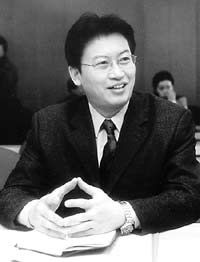The alleged dismissal of China's most well-paid government employee, in East
China's Jiangsu Province, has reignited controversy over the new "contracted
government employees" system.
|

Yan
Bing
|
Yan Bing, formerly a successful businessman experienced in Sino-Japanese
economic exchanges, signed a contract with the Wuxi municipal government in 2004
to be the city's chief government representative attracting investment from
Japanese enterprises.
The contract stipulated that Yan must bring at least 10 Japanese business
delegations to visit Wuxi and attract at least US$50 million in investment from
Japanese enterprises per year in order to receive his 500,000 yuan (US$62,500)
annual salary reportedly the highest wage paid to a government employee at that
time.
But the Shanghai-based Eastern Morning Post has reported that Yan was
dismissed after failing his 2005 performance review, bringing in only US$10
million in his second term.
Yan's alleged dismissal, similar to his hiring two years ago, has provoked
much discussion about the efficiency of the contracted government employee
system.
Defined in the newly revised Civil Servant Law as an emergency measure to
supplement the government's shortage of talent in certain specialized positions,
the institution of contracted government employees has been adopted by a dozen
of Chinese provinces and autonomous municipalities since 2004.
The contracted government employees are generally recruited on short-term
contracts with pay levels many times higher than those of regular civil
servants, but they carry no administrative titles and exercise no administrative
power, according to Ma Jingren, professor with the School of Management at
Shenzhen University.
The contracted government employees are not counted toward any government
hiring quotas and do not enjoy any benefits or perks typically associated with
civil service positions.
More significantly, they may have their jobs terminated due to poor
performance, said Ma.
The new system is now under the spotlight again. Some hoped that it might cut
through a civil service system known for its vast size but low efficiency.
"By introducing market elements and contract relationships, the programme
provides a solution to the problems of narrow exits for government workers, life
tenure and irrational promotion of personnel," said Zeng Li, head of human
resources at a government bureau in Nanjing, capital of Jiangsu Province.
But according to a professor surnamed Kong with the Department of Political
Administration in Nanjing University, these contracted employees are limited to
technical or consultative positions and represent only a small fraction of the
civil service, thus the new system is unlikely to bring dramatic change.
In addition, some experts question whether contracted government employees
will be able to fulfil their tasks as they are confined to providing services
and advice, not decision-making.
"It has been found that as those employees have no administrative power, many
regular government workers are unwilling to meet their requests or provide
co-operation to them, which will make their work difficult to carry out. Thus
this new institution is only recommended for certain technical positions where
there is not so much need for administrative power," said Ma Jingren.
Yan said that at times he was frustrated because he did not have the power to
call on related bureaux for assistance.
"This shortcoming has greatly influenced my work," Yan said.
Experts have called for State bureaux to further regulate the new system,
clearly define the obligations and legal rights of contracted employees, and
make the system run efficiently.